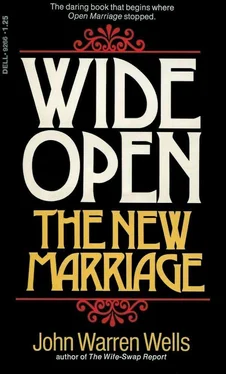“The first girl I lived with was a grad student in botany. I was going to med school at the time. She was enormously interested in medicine herself, had majored in biochemistry and wanted to go to medical school, but couldn’t make the cut. If she wasn’t going to be a doctor, she damn well wanted to marry one. And, incidentally, she succeeded. She’s married right now to an orthopedic surgeon. I think they’ve got two kids.
“I came very close to marrying her myself. I would have, if we hadn’t shacked up. I would have married her out of a desire for permanence and stability and security and all the rest of it. Fortunately, I managed to talk her into living with me. That gave me what I needed at the time without tying me up. After about a month I knew I was never going to marry this girl. Not because she wasn’t right for me — I didn’t really learn that for some time — but because once I had the relationship, I knew I didn’t need to make it legal.
“I’m not talking about sex. We had been fucking our brains out long before we were living together. I didn’t live with her for sex, but so that we could be, I don’t know, call it a temporary family...
“I didn’t tell her I wasn’t going to marry her. Not at the time. If I had, she would have split. As a matter of fact, our breakup came when she finally realized that we were never going to find our way to the altar. I suppose from her point of view she made a mistake living with me, in that she wasted time she could have used finding a husband. That’s being a little hard on her, makes her sound like a calculating bitch. She was calculating, but not a bitch. She just sincerely wanted to get married. I’m sure she’ll make a good doctor’s wife, better than most.
“Ever since then, I’ve been very honest in all my relationships with women. For purely selfish reasons, too. I’m just not comfortable playing games. I’m too old for that routine. I don’t want it. The few girls I’ve lived with have always known in front that I’m not looking for a marriage thing. That I personally cannot afford to be future-oriented in my emotional relationships. They accepted it and were comfortable with it...”
JWW:Couples who live together ultimately marry or separate in a majority of cases. Any of a number of motives may propel two people who have cohabited for an extended period of time into marriage. The most obvious pressure is that of convention; however extensively non-marital cohabitation may be accepted, eventual marriage remains the norm. As an extension of this, marriage often follows upon a mutual desire for a change in life style; when a couple decides to have children, or to move from an apartment to a house, marriage suits this new life style better than “living together.” In much the same fashion, marriage occurs when the partners reach a particular plateau in the maturation process — when they graduate from college, when they become self supporting, etc.
Marriage may be elected because of a change in the nature of a couple’s relationship. Paradoxically, the change may be for the better or for the worse. When a cohabitational relationship seems to be deteriorating, the partners may get married in order to bond themselves more closely together, just as married couples may attempt to resolve their difficulties by having a child. On the other hand, a couple may marry because their relationship has improved to the point where they wish to express a deeper commitment to each other.
Does a marriage have a greater chance of success if the partners have lived together beforehand? An absolute answer cannot easily be supplied, and any data offered would perforce be suspect because of the difficulty of a qualitative judgment of marital success. A survey might determine that such couples were more or less likely to get divorced within a specific period of time, but few of us would be likely to call a marriage successful simply because it has endured. Additionally, it’s theoretically possible that persons likely to live together have a greater or lesser propensity to achieve successful marriages.
Almost invariably, couples who have married after having lived together believe that their marriages have been better as a result. And persons who did not live together before marriage frequently comment that they wish they had done so, either because it would have saved them from an unhappy marriage or because it would have made their marital adjustment easier. This sort of hindsight may not be too significant, but it is interesting for what it reveals of attitudes.
My own opinion is that premarital cohabitation greatly increases the possibility of marital success. But it is no more than opinion.
JWW:Those who do marry after an extended period of living together are sometimes apt to aver that marriage has not changed their relationship, that it constitutes no more than a legal formalization of an existing state. I doubt that this is ever absolutely true. However little importance one attaches to a marriage ceremony, the change in status it conveys inevitably carries connotations of increased commitment, of societal recognition, of implied permanence. By becoming husband and wife, a couple will change in the way that they perceive themselves and their relationship and in the way that they and their relationship are perceived by others.
“After we were married, people reacted to us differently. In subtle ways. Other men who might have come on to me while we were living together weren’t as likely to consider me fair game. Other women were less apt to flirt with my husband than when he was my ‘old man.’ This was along the same lines that we had noticed before when we started living together, and the same thing happened. In each case we were recognized as having deepened our mutual commitment, and people recognized this in their reaction to us.”
JWW:Sometimes there is an immediate urge to rebel against the new relationship. A situation which was quite comfortable beforehand may suddenly seem confining:
“A funny thing, in the year and a half we were living together, I never really had an urge to make love to another woman. I don’t mean that the thought never crossed my mind. When I saw an attractive girl, I would think of her in sexual terms. I think everybody does that, but I never really wanted to do anything about it. Almost immediately after we went through the wedding ceremony, I got a classic case of the seven-year itch. It wasn’t even a desire for a specific girl. I just had a yen for someone besides her. I never did anything about it, although I’m sure I would have if there had been a really ideal opportunity thrown in my face.
“Ultimately I got over it. Probably because I got used to being married. I had wanted to have sex with someone else because I felt I had given up a portion of my freedom and wanted to assert myself. What’s weird is that I knew my motives at the time. That didn’t change anything, the desire was just as strong.”
JWW:Does marriage make it more or less likely for a couple to stay together? At first glance, the answer seems perfectly obvious. Divorce, however readily obtainable it may ultimately become, will always be a more complicated process than simply packing a suitcase and getting new stationery printed. The actual mechanics of separation and divorce, added to the implied commitment of marriage, make the dissolution of a marriage more difficult than the breakup of a non-marital union.
“During our second year of marriage, we went through a very bad time. I was trying to get pregnant and couldn’t, my husband was in a bad situation at work, and we actually did separate for several weeks. He went to a hotel. If we had gone through that bad a time when we were living together, I doubt that we would have stayed together.”
Читать дальше











